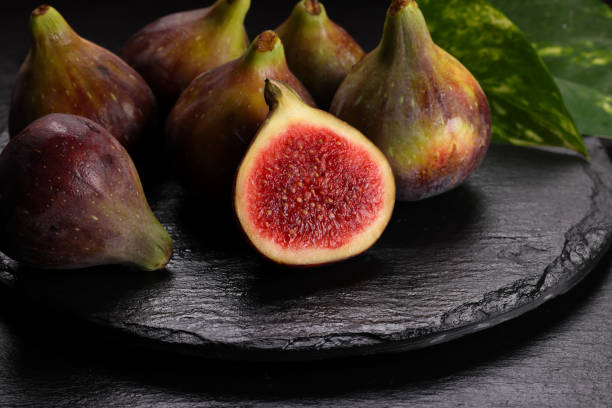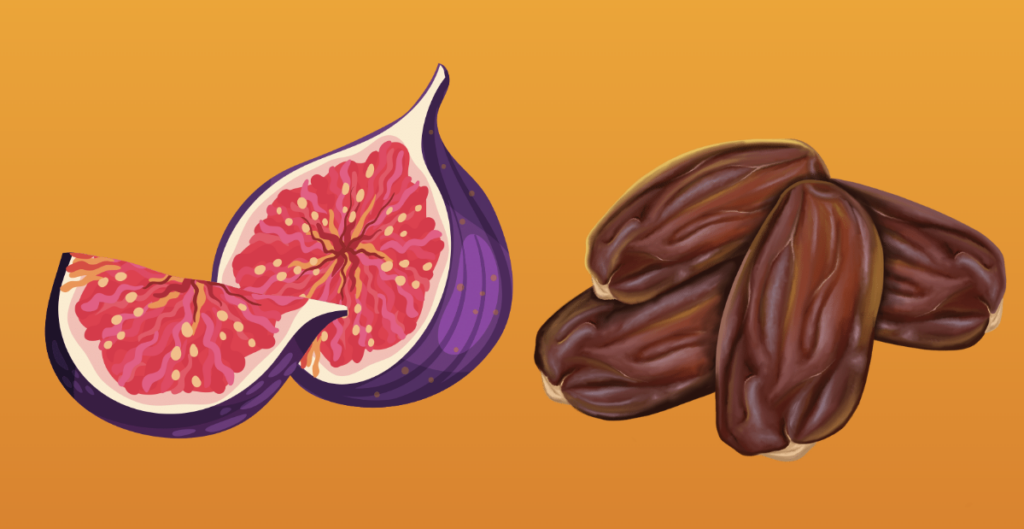What to Eat and Drink
Discover the Health Benefits of Figs vs Dates
Figs and dates are both pleasantly sweet and versatile fruits, but which is healthier? In this article, we’ll look closely at the nutritional profiles of figs and dates, comparing vitamins, minerals, and other key components. Examining their individual characteristics can help you choose which fruit is more suitable for your specific nutritional demands. So, let’s see who takes the crown: figs or dates?
Nutritional Comparison of Figs and Dates
When comparing the nutritional profiles of figs and dates, it is critical to consider their distinct compositions. Figs, with their smooth and sweet texture, are an excellent source of fiber, potassium, and antioxidants. These small fruits are also high in critical nutrients like calcium and magnesium. On the other hand, dates, with their sticky and chewy texture, are high in dietary fiber, potassium, and natural sugars. Dates are also high in antioxidants, which can help reduce inflammation and enhance heart health.
Both figs and dates provide several health benefits, however their nutritional compositions differ slightly. Figs are high in calcium and magnesium, making them an excellent choice for people trying to improve their bone health. Figs are also high in vitamin K, which helps with blood clotting and bone density. Dates, on the other hand, contain more potassium, which is necessary for normal heart function and blood pressure regulation. Dates are also high in iron, making them an ideal choice for people with iron deficiency anemia.

Health Benefits of Figs
Figs are not only delicious, but they also provide a number of health benefits. For starters, its high fiber content can improve good digestion and help with weight management. Figs include soluble fiber, which helps regulate blood sugar levels and prevents insulin surges. Second, figs are high in antioxidants, which can protect the body from inflammation and oxidative damage. These antioxidants can also improve the immune system and lower the risk of chronic illnesses like heart disease and some types of cancer. In addition, figs are high in potassium, which is essential for heart health and blood pressure regulation.
Health Benefits of Dates
Dates, too, provide a variety of health benefits. For starters, their high fiber content aids proper digestion and can help prevent constipation. Dates’ fiber also helps with weight management by increasing feelings of fullness and lowering overall calorie consumption. Second, dates contain antioxidants such as phenolic compounds, which have been associated to decreased inflammation and enhanced heart health. Dates’ natural sugars provide a quick supply of energy, making them an ideal choice for athletes or anybody in need of an energy boost. Finally, the presence of iron in dates makes them an important addition to the diet, especially for people with iron deficiency anemia.

Figs vs. Dates: Which is Healthier?
When it comes to selecting which fruit is better, it all boils down to your individual dietary demands and health goals. Figs are a fantastic alternative for anyone wishing to improve their bone health because they include more calcium and magnesium. They also include high levels of potassium and antioxidants. On the other hand, dates are high in potassium, making them an excellent choice for maintaining appropriate heart function and blood pressure regulation. They are also rich in antioxidants and iron.
In terms of total nutritional content, both figs and dates contain a variety of vitamins, minerals, and antioxidants. Incorporating both fruits into your diet can bring numerous health benefits. However, if you have unique dietary needs or health issues, you should speak with a healthcare expert or a certified dietitian who can evaluate your situation and make individualized suggestions.
How to Incorporate Figs and Dates into Your Diet
Now that you know the nutritional value of figs and dates, let’s look at some creative ways to incorporate them into your diet. Figs can be eaten fresh or dried, and they are a tasty addition to salads, yogurt, porridge, and smoothies. They can also be used in baking, including cakes, muffins, and bread. Dates can be eaten fresh or dried and are a convenient snack on their own. They can also be baked into energy balls or used as a natural sweetener in smoothies or desserts.

Recipes Using Figs
- Fig and Goat Cheese Salad: Toss fresh figs with mixed greens, crumbled goat cheese, and a drizzle of balsamic vinaigrette for a refreshing and flavorful salad.
- Fig and Prosciutto Pizza: Top a pre-made pizza crust with sliced fresh figs, prosciutto, arugula, and mozzarella cheese for a sweet and savory twist on traditional pizza.
- Fig and Walnut Energy Balls: Blend dried figs, walnuts, dates, and a pinch of cinnamon in a food processor, then roll the mixture into bite-sized balls for a nutritious and energy-boosting snack.
Recipes Using Dates
- Date and Almond Smoothie: Blend pitted dates, almond milk, almond butter, and a frozen banana for a creamy and nutritious morning smoothie.
- Date and Nut Energy Bars: Combine dates, nuts, seeds, and a touch of honey in a food processor, then press the mixture into a baking dish and refrigerate until firm. Cut into bars for a healthy on-the-go snack.
- Date and Coconut Bliss Balls: Blend dates, shredded coconut, cashews, and a splash of vanilla extract in a food processor, then roll the mixture into small balls and coat them in additional coconut for a delicious and satisfying treat.
Conclusion
In my assessment, both figs and dates stand out as nutritional powerhouses, offering a plethora of health benefits that can greatly enhance a balanced diet. Figs, with their abundance of fiber, potassium, calcium, and magnesium, emerge as an excellent choice for individuals seeking to bolster their bone health. Meanwhile, dates present their own array of virtues, being rich in fiber, potassium, natural sugars, antioxidants, and iron, making them particularly advantageous for heart health, energy production, and those grappling with iron-deficiency anemia.
When it comes down to deciding between figs and dates, personal preference and individual health needs take center stage. In my own dietary choices, incorporating both of these fruits seems like a wise strategy, ensuring a diverse spectrum of nutrients and flavors that contribute to a well-rounded and nutritious eating plan.
Trusted Health, Wellness, and Medical advice for your well-being


